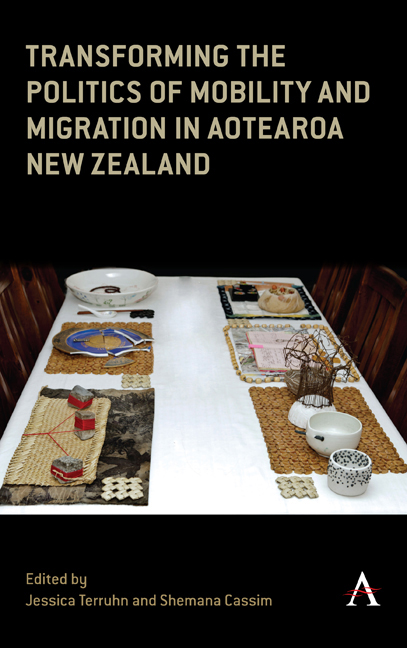Book contents
- Frontmatter
- Contents
- Acknowledgements
- Contributors
- Glossary of Te Reo Māori Words
- Glossary of Te Reo Māori Place Names
- Glossary of Other Non-English Words
- List of Tables
- List of Figures
- Introduction: Reimagining the Politics of Mobility and Migration Through Decolonisation, Social Justice and Solidarities
- Cover Artwork: A Place at the Kauri Table Revisited … 2021
- Part One Decolonising the Politics of Migration
- Part Two Humanising the Politics of Transnational Mobility
- Part Three Building Solidarities for Migrant Rights and Belonging
- Conclusion: Towards Transforming the Politics of Mobility and Migration in Aotearoa New Zealand
- Index
Two - Relational Ethics, Settler Colonialism and the Transformation of Migration in Aotearoa New Zealand
Published online by Cambridge University Press: 28 February 2024
- Frontmatter
- Contents
- Acknowledgements
- Contributors
- Glossary of Te Reo Māori Words
- Glossary of Te Reo Māori Place Names
- Glossary of Other Non-English Words
- List of Tables
- List of Figures
- Introduction: Reimagining the Politics of Mobility and Migration Through Decolonisation, Social Justice and Solidarities
- Cover Artwork: A Place at the Kauri Table Revisited … 2021
- Part One Decolonising the Politics of Migration
- Part Two Humanising the Politics of Transnational Mobility
- Part Three Building Solidarities for Migrant Rights and Belonging
- Conclusion: Towards Transforming the Politics of Mobility and Migration in Aotearoa New Zealand
- Index
Summary
Introduction
This chapter develops a critique of recent approaches to managing migration in Aotearoa New Zealand (hereafter, Aotearoa) and reflects on possibilities for centring relational ethics and upending the dominance of settler colonialism in migration and migrant lives. Migration has become a focus of increasing state attention in Aotearoa over recent decades. Consecutive governments have looked to migration as a response to labour market gaps and a contributor to economic growth while also regulating the effects of migration to minimise its perceived negative consequences in society. This is particularly the case in relation to temporary migration programmes focused on labour and educational migrants, which is the primary focus of this chapter. As in other settler colonial (Roberston 2015; Vosko 2022) and labour migration (Yeoh 2022) regimes, temporary migration programmes in Aotearoa have differentiated social freedoms and rights and partitioned off access to public resources for all but the most desired migrants.
The ethics that underpin temporary migration programmes centre on economic calculus and minimalist human rights, sustaining basic standards in the maintenance of migrant lives without opportunities for transformation. These ethics reflect a consensus view of migrants as holding economic value that can be extracted to achieve national prosperity, even as concerns about migrant exploitation, fraud and exclusion have become widespread. As such, contemporary approaches to temporary migration in Aotearoa and other settler colonial contexts continue the legacy of settler colonialism which also involves the marginalisation or outright erasure of Indigenous peoples (Terruhn 2014). Leveraging off the focus on transformational politics in this collection and the disruptions engendered by the Covid-19 global pandemic, I bring forward the possibility of relational ethics and the significance of such ethics to work against settler colonialism's imprint on migration. In doing so, the chapter contributes to current international discussion of ethics in migration (Tedeschi 2021; Vosko 2022; Yeoh 2022) by making a case for understandings of and approaches to migration that prioritise interdependence, mutual empowerment and reciprocity as substitutes for the control, marginalisation and exclusion which dominate the current consensus around migration management.
I develop the argument in this chapter from my position as a Pākehā migration researcher who is a descendant of White settler migrants who arrived in Aotearoa in the nineteenth century. My ancestors came primarily from Ireland; some came in families and some as individuals. They were encouraged to come.
- Type
- Chapter
- Information
- Publisher: Anthem PressPrint publication year: 2023

